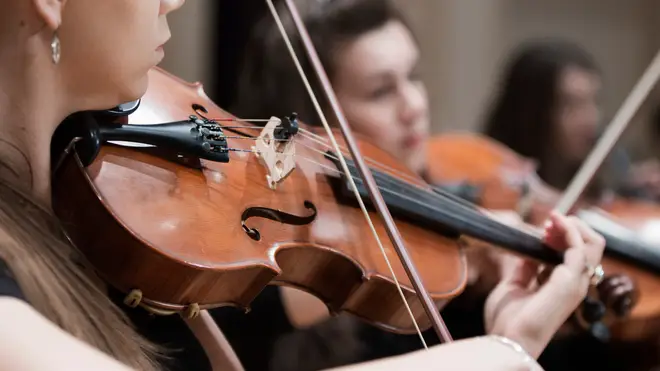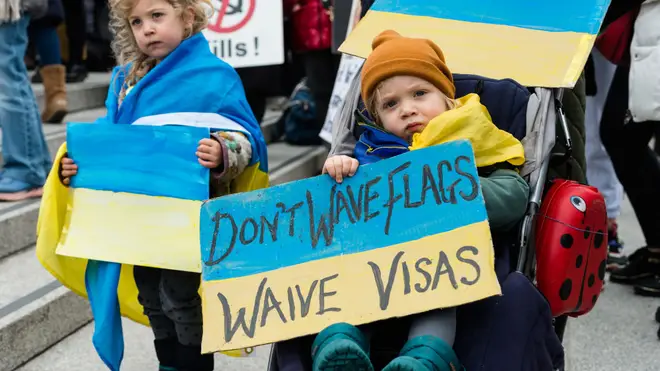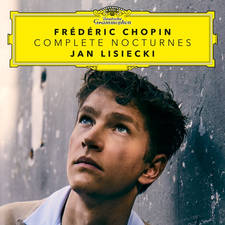17-year-old violinist ‘left in limbo’ in Russian-occupied Ukraine as Britain changes travel policy
11 July 2022, 13:34 | Updated: 11 July 2022, 14:16

The young musician, along with hundreds of other Ukrainian children, has been left waiting three months for a visa from the British government.
17-year-old Anastasiia is a talented young musician living in south-eastern Ukraine.
Before the war, she attended music school, practising the violin for five to six hours a day, but living on the frontline now makes this impossible.
“There are so many bombs and rockets and buildings on fire now,” Anastasiia told The Guardian. “They are fighting every day. I can go out but it is also very dangerous.”
Anastasiia is one of the around 1,000 children who applied for the Homes for Ukraine scheme, but have been left unsure of their fate after the government changed its policy, saying children had to travel with their parents or guardians to the UK.
The issue was meant to have been resolved in June, after the British government announced that those who had already applied for the scheme would be granted safe passage to the UK.
However, the fine print still disqualifies many of these children who are waiting in limbo, as the fine print says that lone children have to have already known their hosts – prior to the war breaking out – unless in “exceptional” circumstances.
Read more: UK government urged to waive visas for Ukrainian orchestras

Anastasiia received a letter at the end of June telling her that she would be contacted again in early July about a new scheme. However, this reiterated that she would only be eligible if her hosts had known her before the war outbreak.
Sally Belsham, 57, from Bishops Stortford in Hertfordshire, has been waiting to welcome Anastasiia since April, a month after the Homes for Ukraine scheme launched.
Belsham and her husband have had extensive background checks and have musical children of their own. Belsham works with refugees and is sympathetic of Anastasia’s plight.
“Just leaving her in this situation is horrible,” Belsham told The Guardian. “It’s really inhuman. I understand the need for safeguarding but you cannot have a system that leaves people in limbo like this.
“There is still no certainty that she will even be approved under this scheme, because we didn’t know her before the war. It’s a nonsense, really. Clearly, the reason we’re in this situation is because of the war and our desire to help and her need to get out.”
Anastasiia lives in the Russian occupied region of Zaporizhzhia. This weekend the deputy prime minister for the ministry of reintegration of temporarily occupied territories, Iryna Vereshchuk, told Ukrainians living in Zaporizhzhia to get out by any means possible.
“You must look for a way to leave because our armed forces will de-occupy,” Vereshchuk said. “There will be a huge battle.”
Anastasiia’s parents look after four adopted children who have various health conditions and cannot leave to travel with her. They also don’t want her to travel on her own without a visa and without the certainty of a host family.
Read more: Russian grenade planted in Ukrainian 10-year-old’s piano: ‘They left a bombshell for a child’
Russia’s troops set fire to grain fields in Ukraine’s fertile Zaporizhzhia region. Remember this picture every time Russians say they care about global food security. Millions of people across the world will face hunger - because Russia launched a brutal war against Ukraine. pic.twitter.com/8BktmNCM79
— Oleg Nikolenko (@OlegNikolenko_) July 8, 2022
Labour life-peer, Alfred Dubs, has been a vocal advocate for refugee children coming to the UK. The 89-year-old former politician was rescued from Prague by the Kindertransport prior to the outbreak of the Second World War in 1939, at the age of six.
He has written multiple letters, raised the cases of child Ukrainian refugees in parliament, and spoken to the Minister directly.
In 2016, an amendment to the Immigration Act in 2016 – which became known as the ‘Dubs amendment’ as it was spearheaded by the campaigner – allowed unaccompanied child refugees from the EU admittance into the UK.
Originally rejected by a majority Conservative Commons, it was accepted by the government, before being removed by the Home Office a year later after taking in just 350 children.
Read more: During World War II Steinway pianos were parachuted onto battlefields to provide relaxation
I am a refugee. When I was six, the UK saved my life and gave me a home and hope.
— Alf Dubs (@AlfDubs) June 16, 2021
This #RefugeeWeek my plea is for the UK to live up to its proud humanitarian tradition by giving hope to the refugee children of today. Children like me. Just our fair share, no more than that. pic.twitter.com/Iv2WhMF4ym
“I have a bit of a fellow feeling with people who arrive here, because I know what it’s like,” Dubs told The New Statesman earlier this year. “I think there’s a hostility to incomers. There’s a hostility to people whether they’re from Europe or further afield”.
In June, Dubs wrote to Prime Minister Boris Johnson, alongside Labour MP Tulip Siddiq, concerning Ukrainian teenagers trapped in their country.
“We are extremely concerned for the welfare of hundreds of Ukrainian teenagers, some unaccompanied, who have not yet received their visas to the UK despite having applied for them in good faith, within the rules, many weeks and in some cases months ago,” Dubs and Siddiq wrote. “When Michael Gove announced the Homes for Ukraine scheme he said there would be ‘no limit to the number of Ukrainians who can benefit from this scheme’.
“On May 23 you wrote an open letter to the ‘children of Ukraine’, many of whom you said had ‘seen or experienced things no child should have to witness’, in which you told them they ‘are not alone’.
“Regrettably, for the teenagers cited above, and in many other cases we are aware of, these statements ring hollow.”
On 29 June, it was announced that the Home Office would waive visa fees for two Ukrainian orchestras performing in the UK this summer. Minister for Safe and Legal Migration, Kevin Foster, said: “The UK is unwavering in its support for Ukraine, and it is incredibly important we keep raising awareness of the barbaric invasion ongoing in Ukraine. Celebrating Ukraine’s culture and music is one way we can keep the country alive in people’s minds.”


































